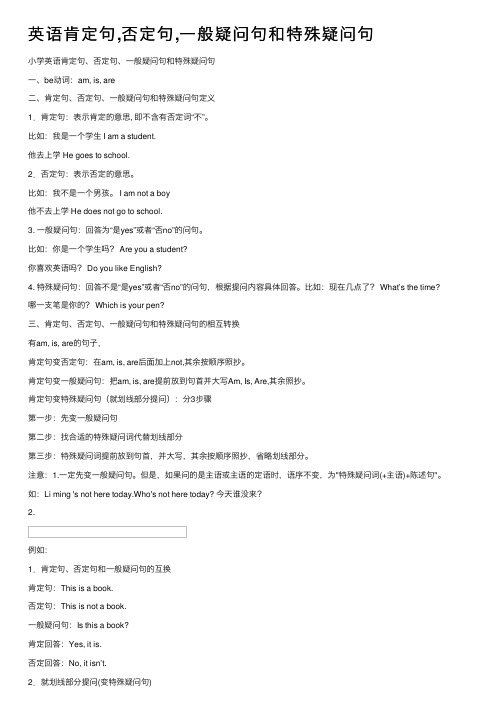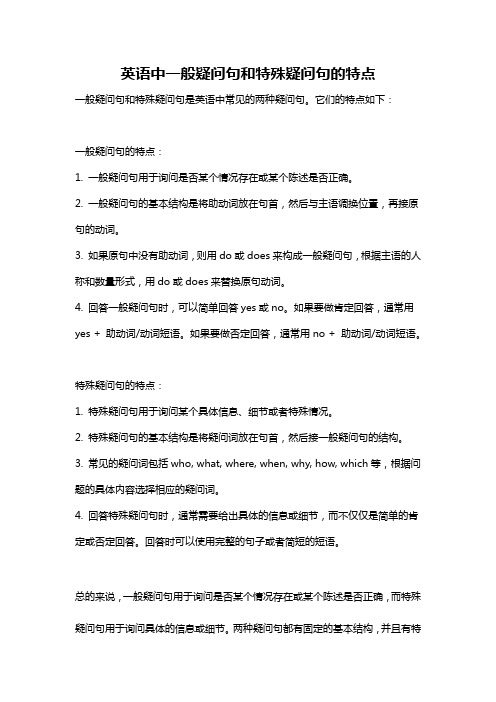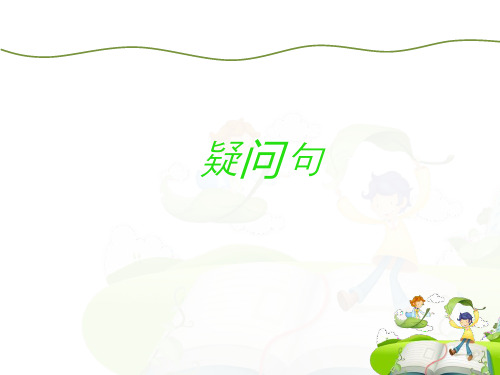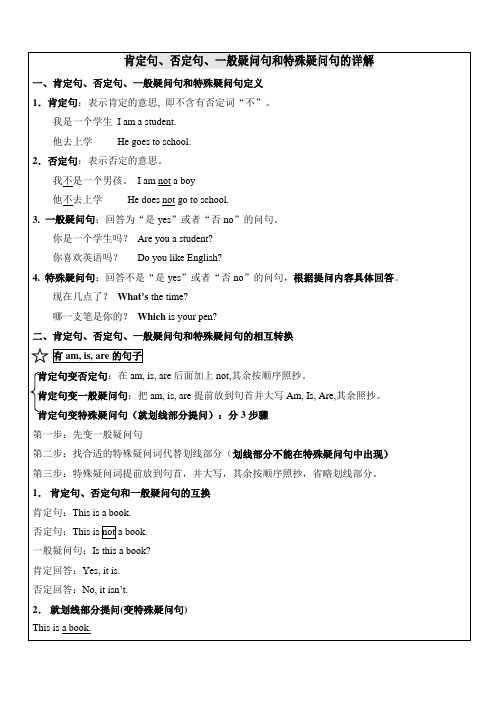小学英语一般疑问句和特殊疑问句
小学英语特殊疑问句和一般疑问句地归纳

特殊疑问句和一般疑问句的答法一般疑问句通常都是 1..以be (am,is,are,)开头2.以Do,Does,Did 开头或以Can开头回答方法:前面用什么提问的就用什么答。
只有两种回答方式:1)肯定的, Yes,主语 + 提问词.2)否定的 No,主语+提问词+not.【注意:问句与答句的第一二人称要互换】如:④主语是名字时的答语:看性别,男的用he ,女的用she ,其他的用it 复数就用they。
如:①Is she……? Is he………? Is it……..?Yes, she is. Yes, he is. Yes, it is.No, she isn,t. No, he isn,t. No, it isn,t.②Are they………? Are the monkeys …….?Yes, they are. Yes, they are.No,they aren’t No,they aren’t③ Do they………? Does he……..? Did she…….?Yes,they do. Yes,he does. Yes, she did.No,they don’t. No,he doesn’t. No,she didn’t.④Are you……..? Are you……..? Do you…….?Yes, I am. Yes, we are. Yes ,I do. 或 Yes,No, I am not. No, we aren’t. No,I don’t. 或No,⑤Does Mike…….? Is ChenJi…..? Do your parents…?Yes ,he does. Yes , she is. Yes, they do.No,he doesn’t. No, she isn’t. No,they don’t.一、专项练习。
1. Did ChenJie read books yesterday?2. Can the girl cook the meals ?—————————————————————————————3.Is he going to swim this afternoon?4. Are they going to take a trip next weend? ————————————————————————————————5.Does he often go to school by bike ? 6. Do you play basketball every weekend? ———————————————————————————————————7. Did Mike do his homework yesterday? 8. Are they playing basketball now?————————————————————————————————一般疑问句及特殊疑问句的总结一般疑问句的定义:用yes或no来回答的疑问句叫一般疑问句。
英语肯定句,否定句,一般疑问句和特殊疑问句

英语肯定句,否定句,⼀般疑问句和特殊疑问句⼩学英语肯定句、否定句、⼀般疑问句和特殊疑问句⼀、be动词:am, is, are⼆、肯定句、否定句、⼀般疑问句和特殊疑问句定义1.肯定句:表⽰肯定的意思, 即不含有否定词“不”。
⽐如:我是⼀个学⽣ I am a student.他去上学 He goes to school.2.否定句:表⽰否定的意思。
⽐如:我不是⼀个男孩。
I am not a boy他不去上学 He does not go to school.3. ⼀般疑问句:回答为“是yes”或者“否no”的问句。
⽐如:你是⼀个学⽣吗? Are you a student?你喜欢英语吗? Do you like English?4. 特殊疑问句:回答不是“是yes”或者“否no”的问句,根据提问内容具体回答。
⽐如:现在⼏点了? What’s the time?哪⼀⽀笔是你的? Which is your pen?三、肯定句、否定句、⼀般疑问句和特殊疑问句的相互转换有am, is, are的句⼦,肯定句变否定句:在am, is, are后⾯加上not,其余按顺序照抄。
肯定句变⼀般疑问句:把am, is, are提前放到句⾸并⼤写Am, Is, Are,其余照抄。
肯定句变特殊疑问句(就划线部分提问):分3步骤第⼀步:先变⼀般疑问句第⼆步:找合适的特殊疑问词代替划线部分第三步:特殊疑问词提前放到句⾸,并⼤写,其余按顺序照抄,省略划线部分。
注意:1.⼀定先变⼀般疑问句。
但是,如果问的是主语或主语的定语时,语序不变,为"特殊疑问词(+主语)+陈述句"。
如:Li ming 's not here today.Who's not here today? 今天谁没来?2.例如:1.肯定句、否定句和⼀般疑问句的互换肯定句:This is a book.否定句:This is not a book.⼀般疑问句:Is this a book?肯定回答:Yes, it is.否定回答:No, it isn’t.2.就划线部分提问(变特殊疑问句)This is a book.第⼀步:变⼀般疑问句 Is this a book?第⼆步:找合适的特殊疑问词 Is this what ?第三步:特殊疑问词提前放到句⾸,并⼤写,其余按顺序照抄,省略划线部分。
小学四年级英语考点之一般疑问句及特殊疑问句

句⼦基本是:简单陈述句,由简单陈述句转变成肯定句,否定句,疑问句。
疑问句是⽤来提出问题。
英语中有四种疑问句: ⼀般疑问句、特殊疑问句、选择疑问句和反意疑问句。
我们现在已经接触到了前两种疑问句。
后两种疑问句以后我们还会学到.⼀般疑问句: 英语中要⽤ yes和no 来回答的疑问句叫⼀般疑问句。
如: 1)Is it hot ?Yes, it is .\No, it isn’t.—— be动词引导 2)Is it a car ?Yes, it is .\No, it isn’t .—— be动词引导 3)Is this your ruler ?Yes, it is .\No, it isn’t .—— be动词引导 4)Do you like bananas ?——含实义动词 Yes, I like bananas. \ No, I don’t like bananas. 5)Can Ming hear a drill ?——含情态动词 Yes , Ming can hear a drill.\No,Ming can’t hear a drill. .陈述句(肯定句,否定句,⼀般疑问句)的转变规律: 1.肯定句:2.否定句:3. ⼀般疑问句及肯否定回答 1) 主语+be动词+….1) 主语+be动词+not+….1)be动词+主语+…? Yes,主语+be动词./ No,主语+be动词+not. I am a teacher. I amnot a teacher.Are you a teacher? --Yes, I am./ No, I am not. My mother is thin. My mother is not /isn’t thin.Is your mother thin? --Yes, she is./ No, she isn’t. They areinsects. They are not/aren’t insects.Are they insects? --Yes. they are./ No, they aren’t. 2) 主语+情态动词can+… 2) 主语+情态动词can+ not+….2)情态动词can+主语+…? Yes,主语+情态动词can/ No,主语+情态动词can+ not He can jump. He cannot/can’tjump.Can he jump? --Yes,he can./ No, he can’t. 3)助动词do/does+主语+…. 动词原形+….动词原形? Yes,主语+助动词do/does. No,主语+助动词do/does+not. He likes to eat apples. He doesn’t like to eat apples. Does he like to eat apples? Yes,he does./ No,he doesn’t.。
英语中一般疑问句和特殊疑问句的特点

英语中一般疑问句和特殊疑问句的特点
一般疑问句和特殊疑问句是英语中常见的两种疑问句。
它们的特点如下:
一般疑问句的特点:
1. 一般疑问句用于询问是否某个情况存在或某个陈述是否正确。
2. 一般疑问句的基本结构是将助动词放在句首,然后与主语调换位置,再接原句的动词。
3. 如果原句中没有助动词,则用do或does来构成一般疑问句,根据主语的人称和数量形式,用do或does来替换原句动词。
4. 回答一般疑问句时,可以简单回答yes或no。
如果要做肯定回答,通常用yes + 助动词/动词短语。
如果要做否定回答,通常用no + 助动词/动词短语。
特殊疑问句的特点:
1. 特殊疑问句用于询问某个具体信息、细节或者特殊情况。
2. 特殊疑问句的基本结构是将疑问词放在句首,然后接一般疑问句的结构。
3. 常见的疑问词包括who, what, where, when, why, how, which等,根据问题的具体内容选择相应的疑问词。
4. 回答特殊疑问句时,通常需要给出具体的信息或细节,而不仅仅是简单的肯定或否定回答。
回答时可以使用完整的句子或者简短的短语。
总的来说,一般疑问句用于询问是否某个情况存在或某个陈述是否正确,而特殊疑问句用于询问具体的信息或细节。
两种疑问句都有固定的基本结构,并且有特
定的回答方式。
小学英语一般疑问句和特殊疑问句

变特殊疑问句分为三步: 一选:根据画线部分选特殊疑问词, 并代替画线部分。 二变:将句子变成一般疑问句。 三提:将特殊疑问词提前。 eg: Amy will go to China next year. where Will Amy go where next year ? Where will Amy go next year ?
Mike: __are we going to this year? Mum: we will go to Harbin. Mike: ______are we going to Harbin? Mum: On 10th Octomber. Mike: __do you go to there? Mum: By plane. Mike: _____are we going to stay in Harbin? Mum: In Grandma’s big house. Mike: _____does Grandma like eating? Mum: She likes eggs very much. Mike: ______season is the best time to Harbin? Mum: Winter. Mike: _____? Mum: Because we can make a snowman there.
4.The supermarket is near the school. Where is the supermarket ? 5. They are playing football. doing what What are they doing ?
特殊疑问句
表示疑问,有疑问词(在开头),回答有很 多种可能。 常用疑问词:
(完整版)小学英语四种基本句型肯定句否定句、一般疑问句与特殊疑问句

类别 陈述句
疑问句
用法
标点
肯定 叙述一件事情或
说明说话人的看法
.
否定
一般 用于提出问题
?
特殊 用于提出问题
?
选择
用于提出问题
?
反意
用于提出问题
?
例句 This is a bag. That's my book. I can see a bag over there. I don't know. Are you a student? Do you like puppets? Can you speak English? What's your name? Where's my bag? How many trees are there?
Is your friend a boy or a girl?
It's a fine day, isn't it?
祈使句 感叹句
特殊:
表示命令或请求、建议
表示惊讶\赞美\愤怒 等强烈情感
.或! !
Put it here! Look at the noticeboard.
How smart! Glad to see you! What a nice pencil case!
why 为什么 问原因 what 什么 问东西 what time 什么时间 问时间 what colour 什么颜色 问颜色 what about…怎么样 问意见 what day 星期几 问星期
三.句子的种类
how much 多少 问价钱 how about …怎么样 问意见 how far 多远 问路程 how long 多长 问时间 How soon 多快,多久 问时间 How often 多久 问频率
一般疑问句和特殊疑问句的用法、结构、回答详细总结归纳

一般疑问句和特殊疑问句的结构、用法、回答详细总结讲解唐赳学英语,必须弄懂英语最基本的两种疑问句,即:一般疑问句和特殊疑问句。
一、一般疑问句一般疑问句是疑问句的一种。
它是指用yes(是)或no(不是)来回答的句子。
翻译成汉语,凡是句末都带有“吗?”的疑问句都是一般疑问句。
1、一般疑问句的总体基本结构:其结构是:系动词be / 助动词/情态动词+主语+其他成分+?如:Are you a student? 你是学生吗?2、一般疑问句的回答方式:肯定回答:Yes,主语+提问的be/助动词/情态动词.如上句:Are you a student? 你是学生吗?肯定回答就是:Yes, I am. 是的,我是。
否定回答:No,主语+提问的be / 助动词/ 情态动词的否定形式(not).如上句:Are you a student? 你是学生吗?否定回答就是:No, I am not.3、英语中的一般疑问句分为两种主要的形式:第一大类:为含有be动词(is am are,was, were)或情态动词的一般疑问句,其结构为:be+主语+其它部分+?情态动词+主语+动词原形+其它部分+?肯定回答用“Yes,主语+be \ 情态动词.”,否定回答用“No,主语+be \ 情态动词+not.”。
be或情态动词和not可用缩写形式,主要有isn’t,aren’t,wasn’t,weren’t,can’t,mustn’t,needn’t等。
例1:Is this your English book?这是你的英语书吗?肯定回答:Yes,it is. 是的,它是(我的)。
否定回答:No,it isn`t. 不,它不是(我的)。
例2:Are these your English books?这些是你的英语书吗?肯定回答:Yes,they are. 是的,它们是。
否定回答:No,they aren’t.不,它们不是。
例3: Can you speak English? 你能讲英语吗?(本句式含有情态动词can 的一般疑问句)肯定回答:Yes,I can. 是的,我能。
英语一般疑问句和特殊疑问句的区别

英语一般疑问句和特殊疑问句的区别英语是一种国际通用的语言,无论是在家庭、学校、职场等各种场合,都有着广泛的应用。
从入门到精通,语法是学习英语的基础,也是掌握英语的关键。
而在英语口语中,疑问句是一个非常重要的组成部分,可以帮助我们更加直接有效地表达思想,更加自如地与人交流。
在英语疑问句中,一般疑问句和特殊疑问句都有着十分重要的地位。
今天,我们就来研究一下英语一般疑问句和特殊疑问句的区别。
首先,英语一般疑问句(也称为直接疑问句)是由“do”/“does”+主语+动词原形组成的疑问句。
比如:Do you like singing? Does she study English? 与一般疑问句相比,特殊疑问句也是英语中一种常见的疑问句,由具体问题的疑问词+主语+动词原形组成,它的作用是求索特定的信息,比如:What time is it now? Who lives in this house?不仅如此,在一般疑问句和特殊疑问句的内容上,也有着明显的差异。
在一般疑问句中,只关注句子的主谓宾结构,常用于询问事实性的答案,如:Do you like music? 但是,在特殊疑问句中,关注的是句子的主语和谓语,但是在疑问词的使用上更加精细,以问题的形式索取特定信息,例如:What the name of your teacher?此外,在英语一般疑问句和特殊疑问句的句型结构上也有着明显的区别。
一般疑问句是由“do”/“does”+主语+动词原形组成,而特殊疑问句是由特定的疑问词+主语+动词原形组成,比如:Do you like English? What did you do?最后,英语一般疑问句和特殊疑问句在句型语序上也有着明显的区别。
一般疑问句是采用强调句的语序结构,即“助动词/be动词+主语+其他而特殊疑问句则是采用陈述句的语序结构,即“疑问词+主语+动词原形+其他”,比如:Do you like singing? Where did she go?以上就是英语一般疑问句和特殊疑问句的区别,掌握和运用这些句型,能够更好地表达思想,有助于我们的英语口语能力的发展。
- 1、下载文档前请自行甄别文档内容的完整性,平台不提供额外的编辑、内容补充、找答案等附加服务。
- 2、"仅部分预览"的文档,不可在线预览部分如存在完整性等问题,可反馈申请退款(可完整预览的文档不适用该条件!)。
- 3、如文档侵犯您的权益,请联系客服反馈,我们会尽快为您处理(人工客服工作时间:9:00-18:30)。
Whose book is this?(单数)
It’s Ann’s.
表示“谁的”
Whose books are these?(复数)
They’re Ann’s.
How much
How much is the book?
It’s ten yuan.
表示“多少钱”
How many
How many books are there?
There are five.
表示“多少数量”
总结:①单数用is复数用are,单数问题单数答,复数问题复数答;
②whose表示“谁的”,回答要有“的”,How much回答有“yuan”
③看到“Is ......或者Are......”开头的问句,回答要有Yes或No。
No, I can’t.
特殊疑问句:对句中的某一成分提问,不用yes和no来回答
疑问词
问
答
用法
what
at is this?(单数)
It’s a ruler.
表示“什么”
What are these?(复数)
They are rulers.
who
Who’s that?
That’s Ann.
表示“谁”
Yes, they are.
No, they aren’t.
Do开头
Do you like panda?
Yes, I do.
No, I don’t.
Does开头
Does he like cat?
Yes, he does.
No, he doesn’t.
Can开头
Can you jump?
Yes, I can.
一般疑问句:以be动词/助动词/情态动词开头,用Yes/No回答,
特点
问
肯定回答(不缩写)
否定回答(要缩写)
Is开头
(表单数)
Is it a book?
Is this your book?
Yes, it is.
No, it isn’t.
Are开头
(表复数)
Are these books?
Are those your books?
